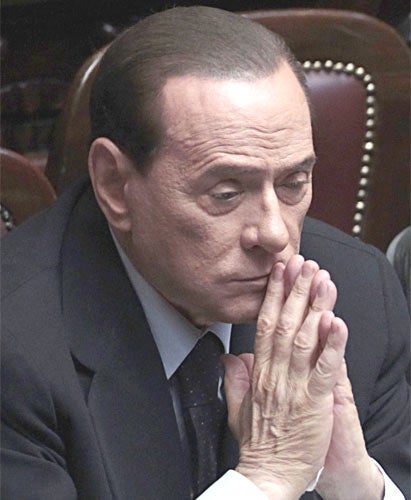Berlusconi says Italy is sound, but fails to convince the markets

Your support helps us to tell the story
From reproductive rights to climate change to Big Tech, The Independent is on the ground when the story is developing. Whether it's investigating the financials of Elon Musk's pro-Trump PAC or producing our latest documentary, 'The A Word', which shines a light on the American women fighting for reproductive rights, we know how important it is to parse out the facts from the messaging.
At such a critical moment in US history, we need reporters on the ground. Your donation allows us to keep sending journalists to speak to both sides of the story.
The Independent is trusted by Americans across the entire political spectrum. And unlike many other quality news outlets, we choose not to lock Americans out of our reporting and analysis with paywalls. We believe quality journalism should be available to everyone, paid for by those who can afford it.
Your support makes all the difference.The Italian Prime Minister Silvio Berlusconi broke a rare, month-long silence to address parliament yesterday, hoping to convince the markets that the economy was sound and recovery around the corner.
His intervention came a day after nervous bond markets once again targeted Italy and Spain, driving the cost of government borrowing to record highs. In Italy this came despite an emergency budget rammed through last month with opposition support.
However, Mr Berlusconi yesterday did little to reassure the world that his government has what it takes to lure investors back. "The country is economically and financially solid. In difficult moments, it knows how to stay together and confront difficulties," Mr Berlusconi said.
"The government and parliament will act, I hope, with a large political and social consensus to fight every threat to our financial stability," he said in speech that offered few initiatives, but reannounced some old ones, including a development fund for the economically stagnant south of the country.
James Walston, professor of Italian politics at the American University in Rome, said: "There was nothing new in it. It was very lacklustre and very low key, a tepid soup for a very ill patient."
Former prime minister Lamberto Dini had this week urged Mr Berlusconi to announce something dramatic such as the privatisation of the post office or the abolition of the provincial layer of government, which is widely seen as redundant, to ensure that his intervention made a difference. But there was no hint of fresh thinking in the speech. Nor did he offer to resign.
He reminded MPs that the level of saving of Italian families was the second highest in Europe, claimed that the government had done much to balance the budget while admitting that there was still much to be done.
He promised symbolic action on politicians' privileges which have infuriated the public as deep cuts are forced on them. But he did nothing to address the markets' main reason for scepticism about last month's budget: the fact that most of the promised measures are only supposed to take effect after his government leaves office in 2013 – the equivalent of promising moonshine.
The slump in value of Italian government bonds on Tuesday, raising yields on 10-year bonds above 6 per cent was reflected in the worst performance by the Milan stock exchange for two years.
The government's position has been further weakened by corruption allegations surrounding Giulio Tremonti, the Finance Minister long seen as Mr Berlusconi's strongest weapon in the war against sceptical markets.
The reaction of the markets to Italy's situation was "absolutely excessive," Mr Berlusconi insisted. "This is not an Italian crisis," he insisted, "but a planetary one... We will not follow the nervousness of the markets."
And he could not resist introducing a personal note. "You are listening," he said near the end of the 35-minute speech, "to an entrepreneur who has three companies quoted on the stock exchange. I am myself in the trenches."
Join our commenting forum
Join thought-provoking conversations, follow other Independent readers and see their replies
Comments